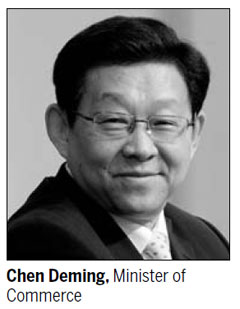Trade still key to country's economic growth
Updated: 2012-04-05 08:05
By Li Jiabao (China Daily)
|
||||||||

Editors' Note: China's current priority is to shift from an economy overly dependent on government investment and foreign trade to one featuring balanced growth that relies more on domestic consumption. However, this does not mean that foreign trade is no longer important or that it can be left to decline. At a recent economic forum, Commerce Minister Chen Deming outlined the trade issues facing the country in 2012.
China's trade development and consumption expansion in the past three decades contributed greatly to the global trade balance, Commerce Minister Chen Deming said during the China Development Forum.
"Retail sales grew by 15 to 18 percent annually in recent years, faster than the GDP growth rate. If not for this unique scenario that China created during its development, the world would have a much more difficult financial crisis to cope with," he said.
Responding to criticism that China did not adequately consider the global trade balance as it rose to become the world's largest exporter, Chen said such critics often ignored that China was also the world's second-largest importer and "will be the world's largest importer, and the biggest consumer market, in the coming years".
China, which has more than 19 percent of the world's population, contributed less than 1 percent to world trade more than 30 years ago, but its contribution to world trade surpassed 10 percent in 2010.
The nation's exports and imports were basically balanced in the past three decades, with a large trade deficit in the beginning, then a trade surplus. Foreign trade has become increasingly balanced in recent years, according to Chen.
The trade surplus accounted for about 2 percent of China's GDP in 2011, while the current account surplus only accounted for 2.8 percent of GDP, he said.
Chen said that unbalanced social development led to frequent financial crises in the past decades. Balanced trade growth in China and abroad is of great significance when the world economy is struggling for a recovery and the debt crisis in the European Union is still deepening.
However, balanced economic growth is relative and temporary, while unbalanced economic development is frequent and persistent, he noted.
Chen said that a comprehensive view should be taken in evaluating whether an economy's growth is balanced. Economic balance, in a narrow sense, refers to whether international trade, overseas investment and immigration, as well as the balance of international payments, are balanced.
But in a broad sense, resource utilization, wealth distribution, capacity to consume, education, pensions and healthcare are all included in judging whether an economy is balanced, because of their influence on people's lives and development.
Chen called for controlled or limited unbalanced economic growth, as well as an open mind regarding the rise of emerging economies.
"Against the background of globalization, a country's unbalanced economic development, if out of control, will not only affect itself but also bring negative, or even disastrous, effects to other countries and the world economy, and in return worsen the unbalanced economy, which can be clearly reflected in the current expanding financial crisis," Chen said.
He added that the rise of emerging economies is the result of globalization and means more opportunities than challenges for developed economies.
"Some developed economies restrain their exports to emerging markets and limit investments from emerging economies, or even turn to trade protection measures, which is unfair and brings negative effects to domestic consumers and companies," Chen said.
In recent years, China's trade surplus has been narrowing, but the trade imbalance between China and the United States has been expanding.
"The US should expand its exports to China to resolve the (problem). But it did not follow this practice, though it spoke many times of loosening export restraints against China," Chen said.
In addition, the US should allow more Chinese manufacturers to invest in the US, which will increase US exports and reduce its trade deficit. It makes no sense to talk about the trade imbalance between China and the US when the US has an unbalanced trade account with the world economy, Chen said.
He suggested the opening up of markets to expand consumption. "Countries should open up their markets and facilitate trade so that expanding consumption, especially final consumption, could be a substantial support for balanced growth at home. China is doing this and is willing to cooperate with other countries for balanced world economic growth," he said.
Consumption consists of goods and services used by individual households or the community. He added that in the coming years, China will further emphasize final consumption in driving economic growth through domestic consumption and the contribution of investment to GDP growth will be lowered.
lijiabao@chinadaily.com.cn
(China Daily 04/05/2012 page17)

 Relief reaches isolated village
Relief reaches isolated village
 Rainfall poses new threats to quake-hit region
Rainfall poses new threats to quake-hit region
 Funerals begin for Boston bombing victims
Funerals begin for Boston bombing victims
 Quake takeaway from China's Air Force
Quake takeaway from China's Air Force
 Obama celebrates young inventors at science fair
Obama celebrates young inventors at science fair
 Earth Day marked around the world
Earth Day marked around the world
 Volunteer team helping students find sense of normalcy
Volunteer team helping students find sense of normalcy
 Ethnic groups quick to join rescue efforts
Ethnic groups quick to join rescue efforts
Most Viewed
Editor's Picks

|

|

|

|

|

|
Today's Top News
Health new priority for quake zone
Xi meets US top military officer
Japan's boats driven out of Diaoyu
China mulls online shopping legislation
Bird flu death toll rises to 22
Putin appoints new ambassador to China
Japanese ships blocked from Diaoyu Islands
Inspired by Guan, more Chinese pick up golf
US Weekly

|

|






